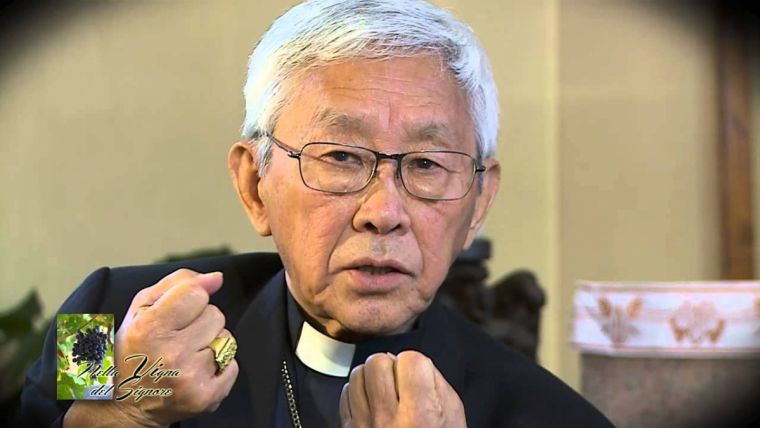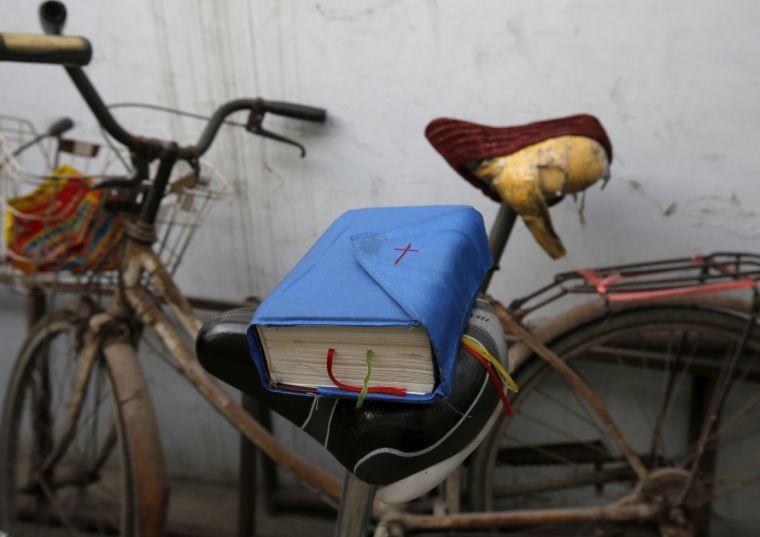Chinese cardinal who says Vatican has 'sold out' warns Francis against reconciling with Communist regime
Cardinal Joseph Zen of Hong Kong has revealed that he traveled recently to Rome for a private meeting with Pope Francis at the Vatican to relay his concerns over proposals aimed at reconciling the Catholic Church in China and the government-backed Catholic Patriotic Association.
Cardinal Zen said that he found the meeting with the pope to be consoling. 'I was rather disorderly in my talking, but I think I succeeded to convey to the Holy Father the worries of his faithful children in China,' the cardinal and archbishop emeritus of Hong Kong, recounted in a letter yesterday which was translated to English and posted to his blog.

The cardinal also confirmed a report in Asia News that the Holy See asked 88-year-old Bishop Zhuang of Shantou in southern Guangdong province to retire so that an illicitly ordained excommunicated bishop could take his place and be recognised by the Vatican.
According to the Catholic News Agency's report about the letter, the pope told Cardinal Zen: 'Yes, I told them [his collaborators in the Holy See] not to create another Mindszenty case!'
This was a reference to Cardinal Josef Mindszenty, who was the Archbishop of Budapest and suffered persecution and imprisonment under Hungary's Communist government before being released during the 1956 uprising and taking refuge in the US embassy as Soviet forces restored Communist control.
Under pressure from the government, the Holy See ordered the Hungarian cardinal to leave the country and named a replacement.
Cardinal Zen said that he considered the pope's reference to the cardinal to be 'meaningful and appropriate,' and described the Hungarian churchman as 'one of the heroes of our faith'.
Last week, it emerged that the Vatican had previously asked Bishop Zhuang to resign in a letter on October 26, 2017. Asia News was told by a church source in Guangdong, who asked not to be named, that Bishop Zhuang 'refused to obey and [would] rather "carry his Cross" for being disobedient'.
With Vatican approval, the bishop had been secretly consecrated in 2006. The Chinese government reportedly considers the bishop to be a priest.
The Catholic News Agency reported that last month, the elderly Zhuang was reportedly escorted to Beijing, despite poor health and cold weather, where he met separately with leaders of the Chinese Catholic Patriotic Association, officials from China's State Administration for Religious Affairs, and the Holy See delegation.
The Chinese government supports the appointment of Bishop Huang Bingzhang, a member of the National People's Congress, to Zhuang's position. Huang was excommunicated in 2011 when he accepted episcopal ordination without the Vatican's permission.
But Zhuang was reportedly given an offer by the Vatican delegation, that if he resigned he could nominate three priests, one of whom Bishop Huang would choose as his vicar general.
The source told Asia News: 'Bishop Zhuang could not help his tears on hearing the demand...it was meaningless to appoint a vicar general, who is still a priest that Bishop Huang could remove him anytime.'
The dispute is just the latest in a series of complicated attempts by the Vatican to address the problem of an underground Catholic Church in China.

Zen said he spoke out given the crucial nature of the moment and given 'the confusion in the media'. He said that the problem is not the resignation of legitimate bishops but rather 'the request to make [a] place for the illegitimate and even excommunicated ones'.
'I acknowledge myself as a pessimist regarding the present situation of the Church in China, but my pessimism has a foundation in my long direct experience of the Church in China,' he said. 'From 1989 to 1996 I used to spend six months a year teaching in the various seminaries of the official Catholic community. I had direct experience of the slavery and humiliation to which those our brother bishops are subjected.'
He went on: 'The Communist government is making new harsher regulations limiting religious freedom. They are now strictly enforcing regulations which up to now were practically only on paper.'
The cardinal said that since the Asia News report, 'many different versions of the facts and interpretations are creating confusion among the people'. He added that as far as he knew the Asia News report was accurate.
He said in his letter that Bishop Zhuang had asked him for help in October when the bishop had first received the communication from the Holy See. The cardinal sent the bishop's letter to Pope Francis. That same month, the Hong Kong-born Archbishop Savio Hon Tai Fai, current apostolic nuncio to Greece and former secretary of the Congregation for the Evangelization of Peoples, brought the cases of Shantou and Mindong to the Pope's attention.
'The Holy Father was surprised and promised to look into the matter,' Cardinal Zen said. 'Given the words of the Holy Father to Archbishop Savio Hon, the new facts in December were all the more a shocking surprise to me.'
The cardinal said that Bishop Zhuang asked him to tell the pope about the Vatican delegation's request in December for his retirement. The cardinal then made a sudden decision to go to Rome to talk to the pope, leaving Hong Kong on January 9, arriving late to the Wednesday General Audience the following day.
The cardinal said that although he had hoped that his appearance would not be widely noticed, his late arrival made it noticeable. He rejected some media reports that claimed he had to 'wait in a queue, in cold weather'.
The cardinal gave Pope Francis an envelope containing a letter from Bishop Zhuang, telling the pope his visit was only to deliver the letter and that he hoped Francis would find time to read it.
Cardinal Zen encouraged prayers for Pope Francis, saying: 'I was there in the presence of the Holy Father representing my suffering brothers in China. His words should be rightly understood as of consolation and encouragement more for them than for me.'
The cardinal said that popes have avoided using the word 'schism' for the government-backed Catholic association 'because they knew that many in the official Catholic community were there not by their own free will, but under heavy pressure'.
He added that the proposed unification 'would force everybody into that community' and questioned whether there could be any common ground with 'a totalitarian regime,' comparing this to a hypothetical agreement between St Joseph and King Herod.
He said: 'So, do I think that the Vatican is selling out the Catholic Church in China? Yes, definitely, if they go in the direction which is obvious from all what they are doing in recent years and months.'
The cardinal said that if an agreement between the Vatican and the Holy See is 'a bad deal...I would be more than happy to be the obstacle.'











